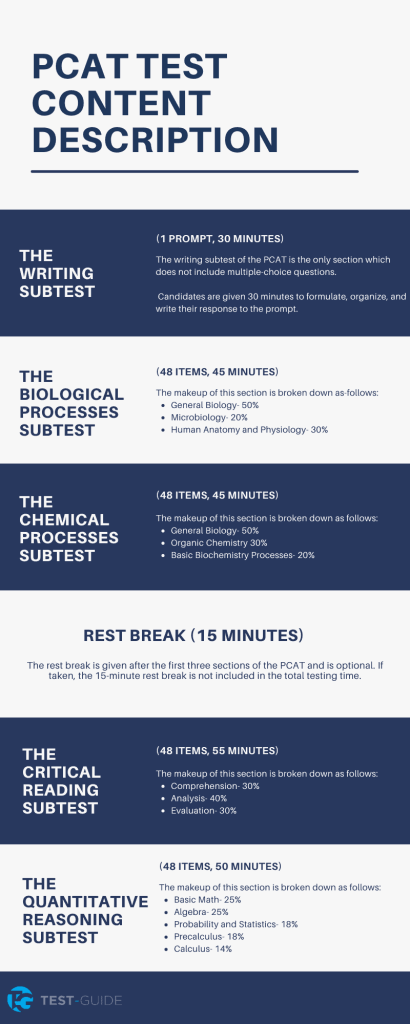Use our free PCAT Practice Tests (updated for 2023) to prepare for your exam. The Pharmacy College Admission Test (PCAT) is a standardized test taken by candidates who intend to apply to pharmacy schools and colleges.
The test is designed to qualify applicants based on the scientific knowledge and academic ability necessary for success within the pharmaceutical field.
Performance on the PCAT Test is vital for any candidate who wishes to gain acceptance into a pharmacology school.
A passing score on the PCAT is not only a requirement for most pharmacy schools, but also indicates the overall workplace readiness of the candidate.
Summary: Try a free PCAT practice test below and see how you do.
The PCAT was created specifically for colleges of pharmacy and includes five different sections. Each section is taken separately and has its own corresponding time limit. The five sections of the PCAT include:
- Writing
- Biological Processes
- Chemical Processes
- Critical Reading
- Quantitative Reading
PCAT practice tests and other resources are available for those interested in preparing for their PCAT Test. Utilization of these resources is vital for those looking to gain employment in the pharmaceutical industry.
Free PCAT Practice Tests
There are many online resources available for those looking to prepare for the PCAT Test. Many of these resources can be found absolutely free online:
| Resource | Provider |
| PCAT Practice Test | Kaplan |
| PCAT Practice Test | Study.com |
| PCAT Sample Questions | Official PCAT Provider |
| PCAT Pop Quiz Sample Questions | Kaplan |
Other PCAT Study Resources
| Resource | Provider |
| PCAT Study Guide PDF | StudyGuideZone.com |
| PCAT Flashcards | Quizlet |
| PCAT Flashcards | Quizlet |
| PCAT Study Guide | StudyGuideZone.com |
PCAT Test Content Description
The PCAT assesses a candidate’s basic scientific knowledge in the following areas: verbal, math, reading comprehension, and writing skills. Candidates must answer 192 multiple-choice questions over four separate timed sections, as well as one writing prompt. The entire test takes 220 minutes for the 192 multiple-choice questions plus the one writing prompt.
The PCAT is administered on a computer-based test (CBT) format, and takes about four hours to complete with a short break provided in the middle of the exam. The PCAT test is comprised of the following subtests:
The Writing Subtest (1 Prompt, 30 Minutes)
The writing subtest of the PCAT is the only section which does not include multiple-choice questions. In this section, candidates are given a typical world problem relevant to the pharmaceutical industry, and are asked to discuss a solution. Candidates are given 30 minutes to formulate, organize, and write their response to the prompt.
The Biological Processes Subtest (48 Items, 45 Minutes)
The biological processes subtest of the PCAT evaluates a candidate’s knowledge in the areas of general biology, microbiology, and human anatomy and physiology.
The makeup of this section is broken down as-follows:
- General Biology- 50%
- Microbiology- 20%
- Human Anatomy and Physiology- 30%
The Chemical Processes Subtest (48 Items, 45 Minutes)
The chemical processes subtest of the PCAT evaluates a candidate’s knowledge in the areas of general chemistry, organic chemistry, and basic biochemistry processes.
The makeup of this section is broken down as-follows:
- General Chemistry- 50%
- Organic Chemistry 30%
- Basic Biochemistry Processes- 20%
Rest Break (15 Minutes)
The rest break is given after the first three sections of the PCAT, and is optional. If taken, the 15 minute rest break is not included in the total testing time.
The Critical Reasoning Subtest (48 Items, 50 Minutes)
The critical reading subtest of the PCAT evaluates a candidate’s knowledge in the areas of comprehension, analysis, and evaluation.
The makeup of this section is broken down as-follows:
- Comprehension- 30%
- Analysis- 40%
- Evaluation- 30%
The Quantitative Reasoning Subtest (48 Items, 50 Minutes)
The quantitative reasoning subtest of the PCAT evaluates a candidate’s knowledge in the areas of basic math, algebra, probability and statistics, precalculus and calculus.
The makeup of this section is broken down as-follows:
- Basic Math- 25%
- Algebra- 25%
- Probability and Statistics- 18%
- Precalculus- 18%
- Calculus- 14%
It is important to use the appropriate PCAT practice tests and study materials for every subtest of the PCAT.
PCAT Test Administration
The PCAT Test can be administered at one of hundreds of locations across the United States, at any Pearson Vue Test Center. Click here to find your nearest testing site and schedule your exam.
On the day of the test, it is recommended that candidates arrive at their scheduled testing center at least 30 minutes prior to your scheduled testing time. Please note that if you are more than 15 minutes late, you will be denied entry into the testing center and will also lose your PCAT registration fee.
Be aware that each individual section is timed, so remember to use your time wisely.
PCAT Test Fees
All fees associated with taking the PCAT are as follows:
| Item | Fee |
| Registration | $210 |
| Late Registration | $49 (non-refundable) |
| Additional Score Report | $20 |
| Additional Official Transcript | $20 (each) |
| Verification | $40 |
| Rescore | $50 (non-refundable, for writing subtest) |
Since costs associated with taking the PCAT assessment can add up, it is recommended that you utilize all available free PCAT practice tests and other resources in order to maximize your chances of success.
PCAT Candidacy Requirements
Anyone wishing to apply to a pharmacy school or college should take the PCAT. Performance on the PCAT will be used as criteria for acceptance into such schools, and may also indicate overall workplace readiness of the candidate.
PCAT Test Scores
Your official PCAT Score Report will be available within five weeks of the conclusion of the testing window in which your exam was taken. Official Score Reports are available online for up to one year from the date the test was taken, and official transcripts are also sent to any institutions designated by the candidate to receive scores.
Please note that pharmacy schools will NOT accept the preliminary score report provided on the date of the test, nor will they accept the Official Score Report which can be viewed online.
Pharmacy schools will ONLY accept Official Transcripts.
Raw Scores: The number of multiple-choice questions answered correctly on each section of the PCAT is your raw score for that section. Every multiple-choice question is worth exactly one raw point, and there is no penalty for an incorrect answer. This means that you should never leave any questions blank on the PCAT. If you find yourself running out of time in a section, you must make sure every question has an answer indicated in order to maximize your score.
The writing section of the PCAT will be evaluated by two essay graders, who will each score you on a scale of 0-6 based on your grammar, style, and ability to provide and support a solution to the problem given. Your writing score will be the average of the two scores given by these graders.
Scaled Scores: Raw scores are converted to a scaled score which falls somewhere on a scale between 200-600. This scaled score is the score which is reported to pharmacy schools as your official PCAT score.
Composite Score: In addition to the scaled scores provided for each individual section of the PCAT, schools will also be given a composite score. Composite scores are calculated as a scaled score which reflects your performance on all sections of the PCAT, with the exception of the writing section.
Please look over this official resource for more information about PCAT scores.
PCAT Test FAQs
How many questions are on the PCAT?
The PCAT assesses a candidate’s basic scientific knowledge in the following areas: verbal, math, reading comprehension, and writing skills.
Candidates must answer 192 multiple-choice questions over four separate timed sections, as well as one writing prompt. The entire test takes 220 minutes for the 192 multiple-choice questions plus the one writing prompt.
How do I prepare for the PCAT?
PCAT practice tests and other resources are available for those interested in preparing for their PCAT Test. Utilization of these resources is vital for those looking to gain employment in the pharmaceutical industry.
What is on the PCAT exam?
The PCAT was created specifically for colleges of pharmacy and includes five different sections. Each section is taken separately and has its own corresponding time limit. The five sections of the PCAT include – writing, biological processes, chemical processes, critical reading, and quantitative reading.


